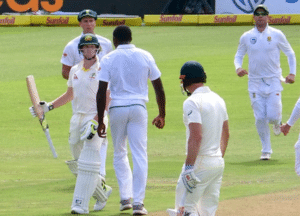As much as we applauded Faf du Plessis for sparking a second Test turnaround at Trent Bridge, we have to say that The Oval hasn’t been his finest hour, writes GARY LEMKE.
Du Plessis is South Africa’s best captain, whether we talk T20, ODIs or Tests. That is not a debate and a likely crushing defeat in the third Test at The Oval on Monday won’t change anything in that regard.
But, I’d love to have been a fly in the wall in the Proteas hotel room when the big debates took place before and during the third Test. It’s a game now titled spectacularly in England’s favour, with just the six wickets required from nearly 600 balls of play on Monday’s final day for them to take a 2-1 series lead. Runs to win don’t enter the equation.
Du Plessis averages over 44 in 67 Test innings. He’s a high-quality cricketer, an intelligent captain, a motivator and someone you want to have in the trenches next to you when you go to war.
Yet, Proteas batting coach Neil McKenzie told SuperSport during The Oval Test that Quinton de Kock is being picked at No4 on the basis that he is such a talent he can dictate where in the order he wants to bat. Let that sink in. De Kock tells the coach and captain where he wants to bat. Confidence is one thing, leadership is another and again the question must arise as to what Russell Domingo’s role is.
Make no mistake, De Kock is a sublime talent and could go on to become one of the greats of the modern game, no matter the format. He has hit three Test hundreds – against England, Australia and Sri Lanka – all at No7. He is better than No7, but why not be flexible with him, be it No4, No5 or even No6?
De Kock is a formidable striker of the ball, instinctively attacking, but – despite McKenzie’s protestations that he scored two fifties against New Zealand at Centurion opening the batting last August in difficult conditions – he has to bat where he is best suited in terms of the state of the game and nature of opposition.
Coming in at No4 against high-quality seamer bowlers like England have when your side is 23-2 or 47-2 as it has been at The Oval, is not the right decision. Du Plessis, albeit these days comfortable at No5, should take the decision to change Plan A. He didn’t and De Kock scored a combined 22 off 27 balls.
Rather shuffle the order when looking to occupy the crease – as was the case in both innings here – by moving Temba Bavuma up the order. He has the technique and the character to drop anchor. De Kock doesn’t – although when chasing 492 a cynic could argue that it doesn’t matter where he batted and it would have made no difference to the result.
Du Plessis also found himself given out in both innings shouldering arms to a pace bowler, becoming only the fourth player in Test history to suffer that fate. Jimmy Anderson got him in the first innings and Ben Stokes in the second, both lbw. At this level it’s such a fine line between a good leave and a bad leave, and Du Plessis made two bad leaves, suggesting there’s plenty of work ahead of him in the nets before the last Test arrives later in the week.
We are unlikely to get the answer, but when did the Proteas management know that Vernon Philander was feeling under the weather, because his enforced absence for long periods cost the Proteas dearly. Was it a case of ‘pick and hope for the best’ and that backfired?
With Philander well below par, the responsibility fell to Morne Morkel, Kagiso Rabada, Chris Morris and Keshav Maharaj to make inroads on the England batting line-up. Morris is a four-Test rookie and hasn’t played County cricket and his control of the red ball was erratic. He leaked runs and allowed the England batsmen to lift the lid on the pressure cooker. In short, he was largely poor in this Test.
The white flag was already being flown before tea on Sunday when Dean Elgar was handed the ball as South Africa waited for Joe Root to make the declaration. His three overs were nothing more than chucking pies down to the other end and they leaked 28 runs.
Runs weren’t the issue, it was simply a signal of resignation from South Africa who seem to have accepted their fate in this Test match.
At least Elgar and Bavuma battled manfully in the final session to ensure South Africa could awake on Monday dreaming of a miracle.
Photo: Philip Brown/Getty Images





